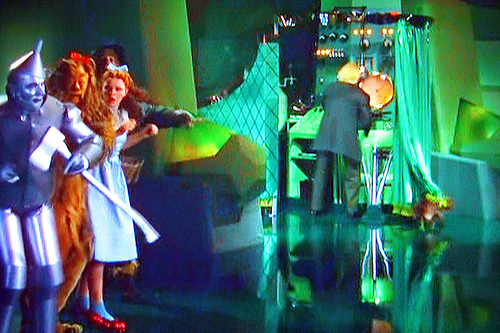 In round 2, Bowman descends to close combat on a few central texts. But first, he makes the methodological point that it is too easy to claim simply that your preferred texts are clear, whereas the ones central to your opponent’s case are obscure or ambiguous. I think that’s right, and that it is also correct that “academia… encourages revisionism”. He says,
In round 2, Bowman descends to close combat on a few central texts. But first, he makes the methodological point that it is too easy to claim simply that your preferred texts are clear, whereas the ones central to your opponent’s case are obscure or ambiguous. I think that’s right, and that it is also correct that “academia… encourages revisionism”. He says,
In the end, “clarity” and “obscurity” are usually subjective judgments that reflect the beliefs of the interpreters more than they inform us about the texts themselves.
I suspect this is going too far, but this isn’t flag-worthy. Yet it will come back to haunt him.
Bowman then argues that we should focus on the most relevant passages, he says, to “the identity of Jesus Christ”. I think he means, the metaphysical status of Jesus. The eight passages he names are certainly important ones, and I agree that any responsible unitarian should pony up plausible, non-arbitrary readings of all of them.
Next, he tells us that
This post will address the texts in Matthew and John, along with an excursus on two texts in John that anti-Trinitarians claim deny that Jesus is God. (emphasis added)
As the whole positive case that the Bible implies the deity of Jesus is in the book (and later in this debate?), Bowman here chooses to play defense.
Let’s take his texts in turn.
- Mt 28:16-20 – Bowman insists that what some disciples doubted was whether or not Jesus should be worshiped. This, to me, is an oddball reading, inserting our theological concerns into the passage. One would think what they doubted was that they were seeing Jesus – evidently he was far off initially, and then in v. 18 he comes closer. Flag: Bowman is flat wrong to assert that “Nothing in the context suggests that what some doubted was… that it was Jesus whom they saw.” If Jesus was God, how could all authority have been given to him (by God)? Bowman wants to say that the incarnate Jesus had humbled himself and so had to be given authority, but I take it this ignores the difficulty. If God, by virtue of his essential attributes, necessarily has all authority, then he can’t lack it, and so can’t receive it from another. It is unclear what Bowman’s answer to this would be. Regarding the seeming baptismal formula, as Bowman reads it, here “Jesus… identifies himself… as the Deity to whom each disciple is to commit himself”. Eh…? Does Bowman really think this is the obvious meaning of the text? Is he that unable to imagine other readings? (I say a few relevant things here.) If so, this tells us more about Bowman, than about the text. Finally, according to Bowman v. 20 says that Jesus is omnipresent – and I assume his point is that only God is omnipresent. But this is too quick – Jesus had a body, so in some sense, he was here (e.g. Galilee) and not there (e.g. Samaria). He’s still got one, albeit a transformed one. Note that it is the risen, glorified Jesus which is in some sense wherever his followers are – but God is supposed to be essentially (and so always) omnipresent. It will have to be, if Jesus is God, that he has always been omnipresent – but now we’re back to the embodiment issue. This is just too quick. And why exactly couldn’t even a creature be in some sense omnipresent, through, say the action of God? Finally, Bowman urges that all this confirms his reading of Mt 1:23, that the author means in calling Jesus “Immanuel” that Jesus is God. Yet again, a draw, bordering on question-begging or special pleading – Burke has explained why it is not arbitrary to read “Immanuel” as not implying that.
- John 1 – Bowman can’t get himself to take a unitarian reading of John 1, like that of Anthony Buzzard, seriously. He’s stuck thinking that they are simply overlooking the obvious meaning of v. 1-3. It is not clear to me that he understands their reading. Briefly, it is this. The Word / Logos is a divine attribute, mildly personified. (Compare: Lady Wisdom’s speech in Proverbs 8.) It’s always been around, and is not someone other than God (v.3), though it is “with” him (v.2) – with him as an attribute is with what has it. By it/him God made all. It is this which “became incarnate” in the man Jesus. (v.14) Basically at v. 14, the subject switches from God’s Wisdom to Jesus the expression or embodiment of it. Whatever the merits of this reading, it seems consistent, and the tie-ins with Proverbs 8 make it far from ad hoc.
![confused bush]() In contrast, Bowman offers the sketch of a reading which is apparently contradictory and the start and at the end of the chapter. Bowman appeals to paradox (apparent contradiction) but doesn’t quite say what this is. (Doing that would sink his reading.) Evidently the starting paradox is this: the Word just is God (v.2) and is “with God” (v. 3) even though nothing can be properly said to be “with” itself. While he glosses this as the Father being with the Son (seemingly consistent) evidently, as each just is God, that’s where the paradox arises. So: f = g, s = g, and yet f ? s. This is indeed an apparent contradiction. But it is also a real one, and demonstrably so (transitivity of =). Insisting on a controversial textual reading in 1:18, Bowman finds the same contradiction there. Poor John – so confused! Flag: by the principle of charity, an inconsistent reading should be avoided if at all possible, and Bowman has not even come close to showing that his is the best of all available readings.
In contrast, Bowman offers the sketch of a reading which is apparently contradictory and the start and at the end of the chapter. Bowman appeals to paradox (apparent contradiction) but doesn’t quite say what this is. (Doing that would sink his reading.) Evidently the starting paradox is this: the Word just is God (v.2) and is “with God” (v. 3) even though nothing can be properly said to be “with” itself. While he glosses this as the Father being with the Son (seemingly consistent) evidently, as each just is God, that’s where the paradox arises. So: f = g, s = g, and yet f ? s. This is indeed an apparent contradiction. But it is also a real one, and demonstrably so (transitivity of =). Insisting on a controversial textual reading in 1:18, Bowman finds the same contradiction there. Poor John – so confused! Flag: by the principle of charity, an inconsistent reading should be avoided if at all possible, and Bowman has not even come close to showing that his is the best of all available readings. - John 20:26-31 – Bowman asserts that “in biblical language ‘my God’ can only refer (on the lips of a faithful believer) to the Lord God of Israel.” This of course is precisely what unitarians deny, and Bowman merely asserts it here. If “god” applies more widely than only to God, why not “my god”? Flag: begging the question. Also, Bowman mocks as “tortured” the reading that Thomas here refers dually to Jesus (Lord) and the Father (God). I agree with Bowman that on grammatical grounds this reading is less likely, but I don’t think it is mockable – it seems to have been a slogan in the first century that Christians serve, as Paul says, one God and also one Lord. (1 Cor 8:6) – also share one baptism, one spirit, and one “body”. Bowman detects the same paradox as above, and again seems to think that this is not a liability of his reading. He subtly helps himself to some of the old qua-nonsense: qua human Jesus honors and worships God, but qua divine Son he does not. I don’t have the patience now to parse what this might mean; let it suffice to say that this talk seems to just thinly paper over the contradiction that Jesus does and doesn’t worship God, or does and doesn’t have a God. This all, to Bowman, is simply a humble acceptance of what the text clearly says “tensions” and all – declining to rationalistically explain its contents away.
- John 10:22-39 – Bowman, like many readers, insists that Jesus’ Jewish interlocutors, who’ve been portrayed as stupidly misunderstanding him in several previous incidents, surely got it right that he was claiming to be, or to be in some sense “equal to” God. Surely those guys couldn’t have misunderstood Jesus. Jesus, Bowman says, doesn’t here deny that he’s God. That’s right. What he denies, is that it is blasphemous to claim that he’s the Son of God, for even lesser men are called by a stronger title – “gods”! Burke’s treatment makes sense of Jesus’ argument here; as far as I can see, Bowman’s doesn’t. Bowman wants to read “The Father and I are one” as an allusion to the Shema – i.e. they are one god. (This again, probably following Jesus’ opponents.) This, even though Jesus seems assume his distinctness from God in the preceding verse. I guess if Bowman is right, God gave the “sheep” to himself, and even though Father and Son are “in” each other, they just are each other. And of course, they are not (as some things are true of one, which are not true of the other). John, after all, loves paradoxes.
- Finally, another favorite unitarian proof text: John 17:1-5. Bowman reads this is if Jesus were asserting that the Father is divine. He then spins, surely, this is consistent with it also being true that Jesus is divine. Sure, but that’s not what is going on here – Jesus is not talking about the Father here. He’s addressing the Father, and says to him among other things that he, the Father, is “the only true god”. Whether this means that the Father is numerically identical to God/Yahweh or that the Father is the only divine being seems not to matter. If the Father is either one, then anyone else is not – the Father is the only one. And in addressing the Father second person, Jesus is presupposing that the Father, the one true god, is someone else – someone other than Jesus. Bowman reads this text, in the end, as assuming that the Son is not the Father, but each of them is identical to God (and so, it follows that each is identical to the other. If A = C, and B = C, then A = B.) But of course, they differ. Again, John, as Bowman reads him, is the great self-contradictor.
While Bowman would think that an evident contradiction would doom, say, a Buddhist or a Jehovah’s Witness to humiliating defeat, when it is his contradiction, apparently it is a sign that he’s onto some profound truth. Flag: special pleading.
I previously wondered what precisely Bowman thinks “the” doctrine of the Trinity is. I’m now inclined to think that at least sometimes he holds it to be no more or less than this inconsistent tetrad of claims (they can’t all be true – from the truth of any 3, it follows that the 4th is false).
- f = g
- s = g
- h = g
- f ? s ? h
If this is what the Trinity doctrine is, Christianity’s enemies can rest easy, for it is demonstrably the case that 1-4 are not all true.  Atheists, Muslims, Jews, take note – you can cite Bowman for support. Sure, he can insist that the contradiction is merely apparent, but this is about as convincing as the mighty Oz howling “Ignore the man behind the curtain!”
Atheists, Muslims, Jews, take note – you can cite Bowman for support. Sure, he can insist that the contradiction is merely apparent, but this is about as convincing as the mighty Oz howling “Ignore the man behind the curtain!”
Ironically, Bowman seems to think these texts are really, really clear (despite his warning above) – so clear that he can rest in an evidently contradictory reading of them. Sorry, but a really clear contradiction is an interpretation buster – unless you are prepared to admit that the author is simply confused. Evident inconsistency is evident falsehood.
While round 1 was a draw, all things considered, I’d have to call round 2 slightly in favor of Burke. He lays out a broad if incomplete case, and effectively rebuts some of the other side’s proof-texts for the divinity of Christ, whereas Bowman essentially says “the positive case is in the book”, and then gives his readings of about 5 central texts. Burke ignores some of the tough problems for his unitarian christology, but Bowman ends up at several crucial junctures assuming that his (implicitly contradictory) readings are rather obviously correct. Staking all on a few texts, he seems to hand Christianity’s opponents a big gift on a platter.
Thus, my score so far:
Bowman: 0
Burke: 1
draw: 1
Update: in comments on Rob’s post, Dave says a lot more. In #6 he explains the meaning of the Greek words translated “worship” etc, and thus why he’s unconvinced by this argument: Jesus must be fully divine because he is properly worshipped. In comments #7-10 he says a lot more about the unitarian reading of John 1 I briefly explain above, and in #10 he addresses Jesus being called “theos” is John 20. Along the way he appeals to some serious scholars, including the super heavyweight Dunn, who it seems has a new book, not yet available in the US, on the issue of whether Jesus was worshiped in NT times. In #11-12 he revisits John 17 and other passages, highlighting the idea that Jesus is a special agent, acting on God’s behalf. In #10 he pleads:
Please consider if a non-paradoxical answer may be more likely!
It’s all worth a careful read.
The post SCORING THE BURKE – BOWMAN DEBATE – Bowman 2 appeared first on Trinities.
 In contrast, Bowman offers the sketch of a reading which is apparently contradictory and the start and at the end of the chapter. Bowman appeals to paradox (apparent contradiction) but doesn’t quite say what this is. (Doing that would sink his reading.) Evidently the starting paradox is this: the Word just is God (v.2) and is “with God” (v. 3) even though nothing can be properly said to be “with” itself. While he glosses this as the Father being with the Son (seemingly consistent) evidently, as each just is God, that’s where the paradox arises. So: f = g, s = g, and yet f ? s. This is indeed an apparent contradiction. But it is also a real one, and demonstrably so (transitivity of =). Insisting on a controversial textual reading in 1:18, Bowman finds the same contradiction there. Poor John – so confused! Flag: by the principle of charity, an inconsistent reading should be avoided if at all possible, and Bowman has not even come close to showing that his is the best of all available readings.
In contrast, Bowman offers the sketch of a reading which is apparently contradictory and the start and at the end of the chapter. Bowman appeals to paradox (apparent contradiction) but doesn’t quite say what this is. (Doing that would sink his reading.) Evidently the starting paradox is this: the Word just is God (v.2) and is “with God” (v. 3) even though nothing can be properly said to be “with” itself. While he glosses this as the Father being with the Son (seemingly consistent) evidently, as each just is God, that’s where the paradox arises. So: f = g, s = g, and yet f ? s. This is indeed an apparent contradiction. But it is also a real one, and demonstrably so (transitivity of =). Insisting on a controversial textual reading in 1:18, Bowman finds the same contradiction there. Poor John – so confused! Flag: by the principle of charity, an inconsistent reading should be avoided if at all possible, and Bowman has not even come close to showing that his is the best of all available readings.